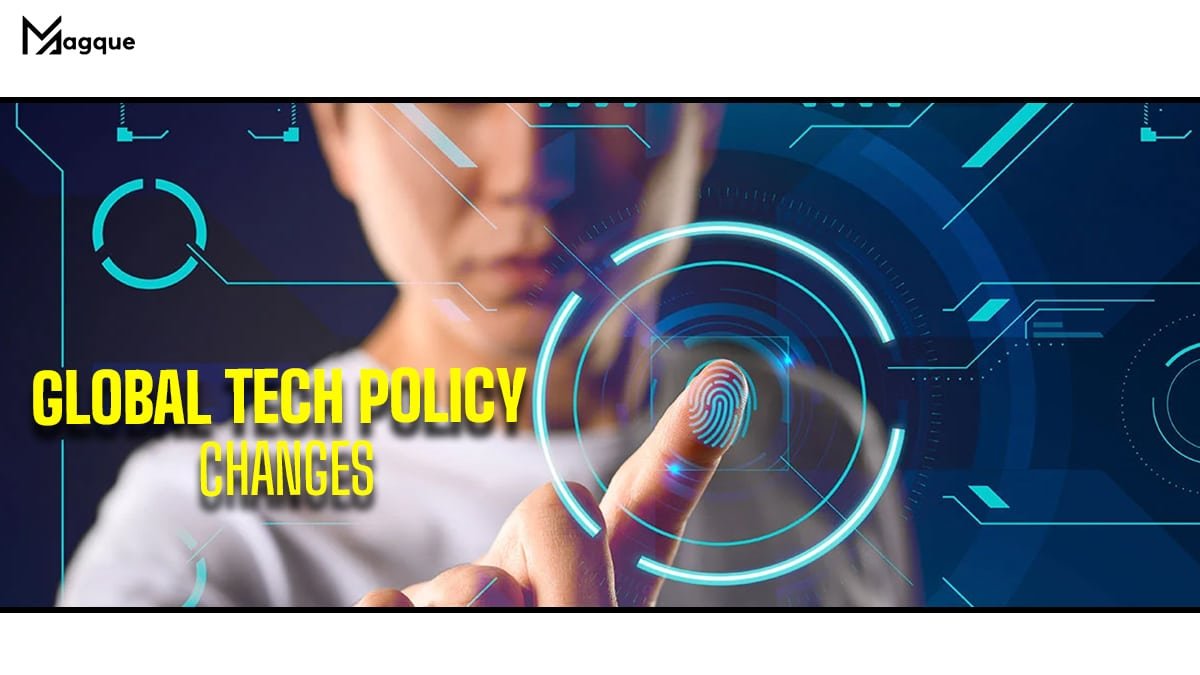In the ever-evolving technology landscape, staying ahead of global tech policy changes is akin to navigating a ship through the shifting sands of the digital ocean. It’s no secret that with the rapid pace at which technology advances, regulatory bodies worldwide are constantly playing catch-up. This dynamic dance between innovation and regulation shapes the tech industry and has profound implications for businesses, consumers, and society.
The Catalysts Behind the Changes
So, what’s driving these policy shifts? The relentless march of technological progress, from AI to IoT, blockchain to quantum computing, is at the heart of it all. These aren’t just buzzwords; they represent transformative forces reshaping our world. As these technologies intertwine with everyday life, governments are stepping in to ensure that innovation doesn’t come at the cost of public safety, privacy, and ethical standards.
The Impact on Businesses and Consumers
For businesses, especially startups like Magque, navigating these policy changes is like walking a tightrope. On one side, there’s the promise of leveraging cutting-edge tech to disrupt markets and create value. Conversely, the risk of falling foul of new regulations can vary dramatically across different jurisdictions.
Consumers, meanwhile, find themselves at the crossroads of convenience and privacy. How do we reap the benefits of technology while safeguarding our data against misuse? This question is becoming increasingly pertinent, and policy changes aim to address it.
Looking Ahead: What Does the Future Hold?
Predicting the future of global tech policy is like trying to catch lightning in a bottle. However, a few trends are likely to shape the coming years:
- Expect a continued emphasis on data protection, as exemplified by GDPR in Europe.
- The ethical use of AI will be subject to greater scrutiny, and policies will focus on transparency, accountability, and fairness.
- As digital currencies gain traction, we’ll see more regulations to ensure financial stability and prevent cybercrime.
Conclusion: The Road Forward
For companies like Magque, staying ahead in this ever-changing landscape means not just compliance but also embracing the spirit of these changes. It’s about recognizing that at the intersection of technology and policy lies the opportunity to build an innovative, inclusive, ethical, and secure future.
Navigating global tech policy changes isn’t just about avoiding pitfalls; it’s about charting a course toward a tech-driven future that benefits everyone. As we stand on the brink of this new digital era, it’s clear that the only way forward is together, guided by the light of innovation and safeguarded by the anchor of regulation.
FAQs
Q1 What are global tech policy changes, and why do they matter?
Global tech policy changes refer to the adjustments and new regulations introduced by governments worldwide to address the evolving landscape of technology. These changes matter because they impact how technology companies operate, how products and services are developed and delivered, and how consumers interact with technology. From privacy concerns to ethical use of AI, these policies aim to balance innovation with consumer protection, security, and fairness in the digital age.
Q2 How do these policy changes affect startups and established tech companies?
For startups, these policy changes can represent both challenges and opportunities. Navigating the complexities of new regulations can be daunting, especially for companies with limited resources. However, compliance with these policies can also provide a competitive edge, showcasing a commitment to privacy, security, and ethical practices. For established tech companies, these changes often require adapting business models, investing in compliance frameworks, and potentially facing stricter scrutiny due to their larger impact on the market and society.
Q3 What role do data protection and privacy play in global tech policy changes?
Data protection and privacy are at the forefront of many global tech policy changes. With the increasing amount of personal data collected by tech companies, governments are implementing stricter regulations to ensure this information is handled responsibly. Policies like the General Data Protection Regulation (GDPR) in the European Union set a precedent for how personal data should be protected, granting individuals more control over their information and imposing heavy penalties for violations.
Q4 Can global tech policy changes stifle innovation?
There is a concern that overly strict or hastily implemented tech policies could stifle innovation by creating burdensome regulatory hurdles for tech companies. However, thoughtful, well-designed regulations can foster innovation by setting clear guidelines and standards that encourage responsible development and use of technology. The key is finding a balance that promotes innovation and the public good.
Q5 How can individuals and businesses stay informed about and adapt to these changes?
Staying informed requires a proactive approach, including following news from reputable sources, participating in industry forums, and consulting with legal and compliance experts. Businesses, in particular, may benefit from developing a regulatory compliance strategy that includes ongoing monitoring of policy changes, training for staff on relevant laws and regulations, and integrating compliance into the product design and development process. Awareness and education on how tech policies affect their rights and technology usage are crucial for individuals.
Read Also This:- The Future of Internet Privacy Laws













